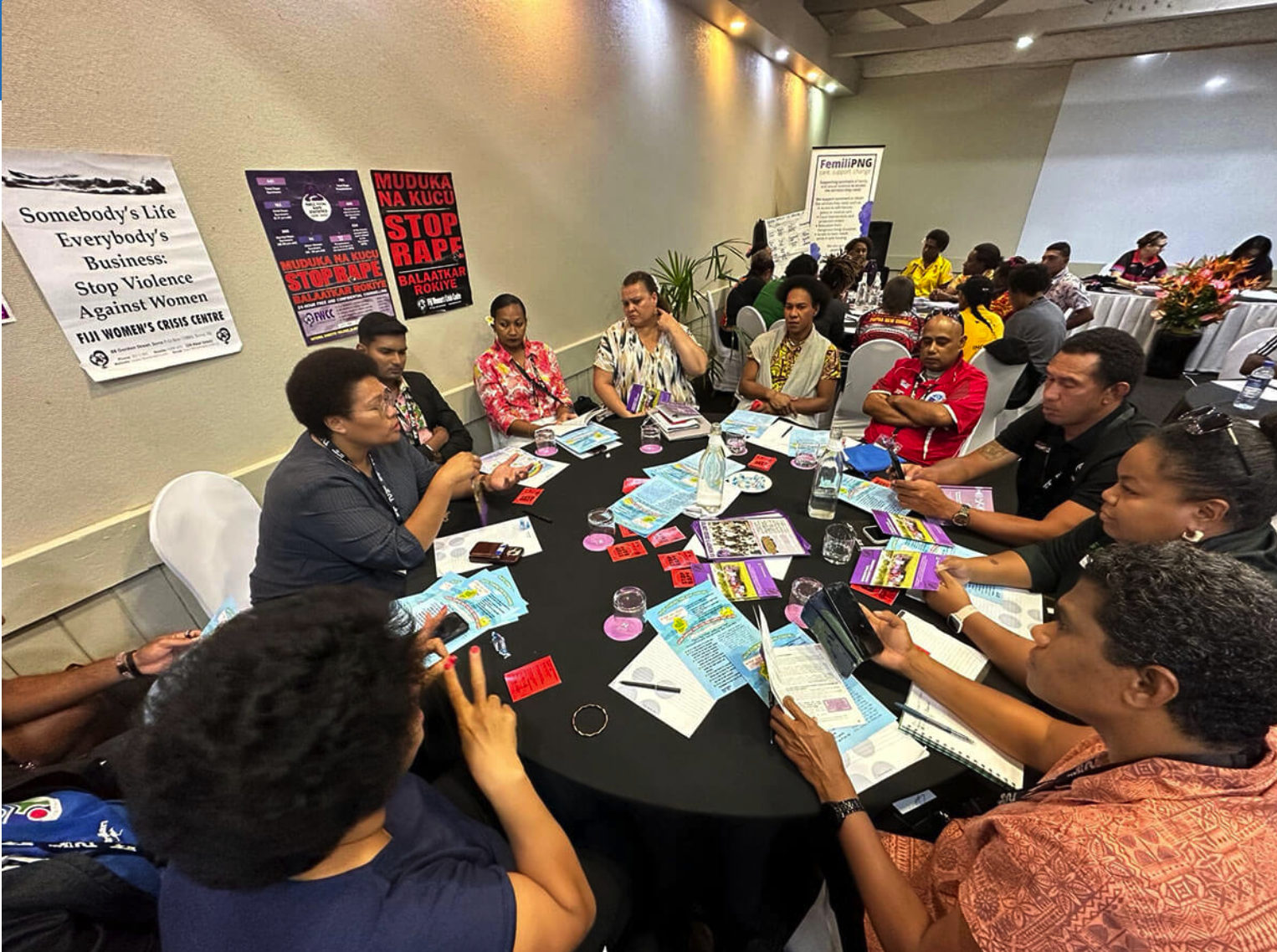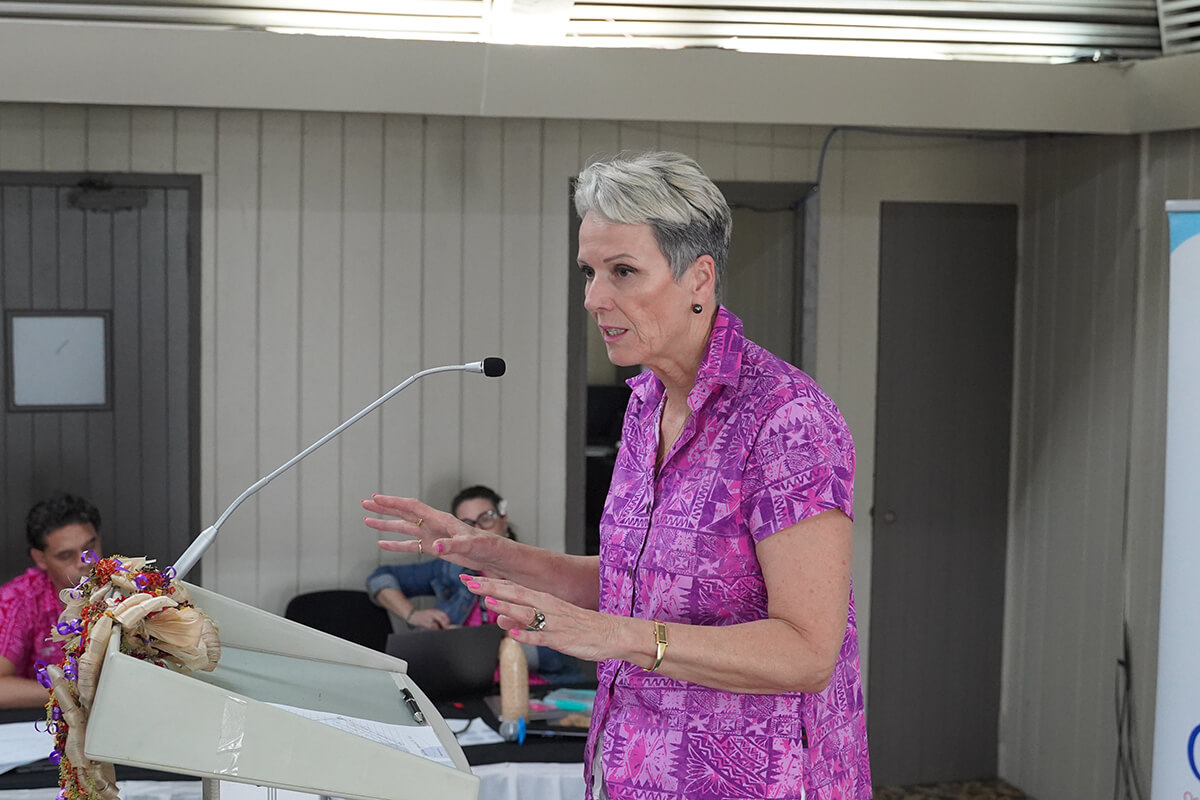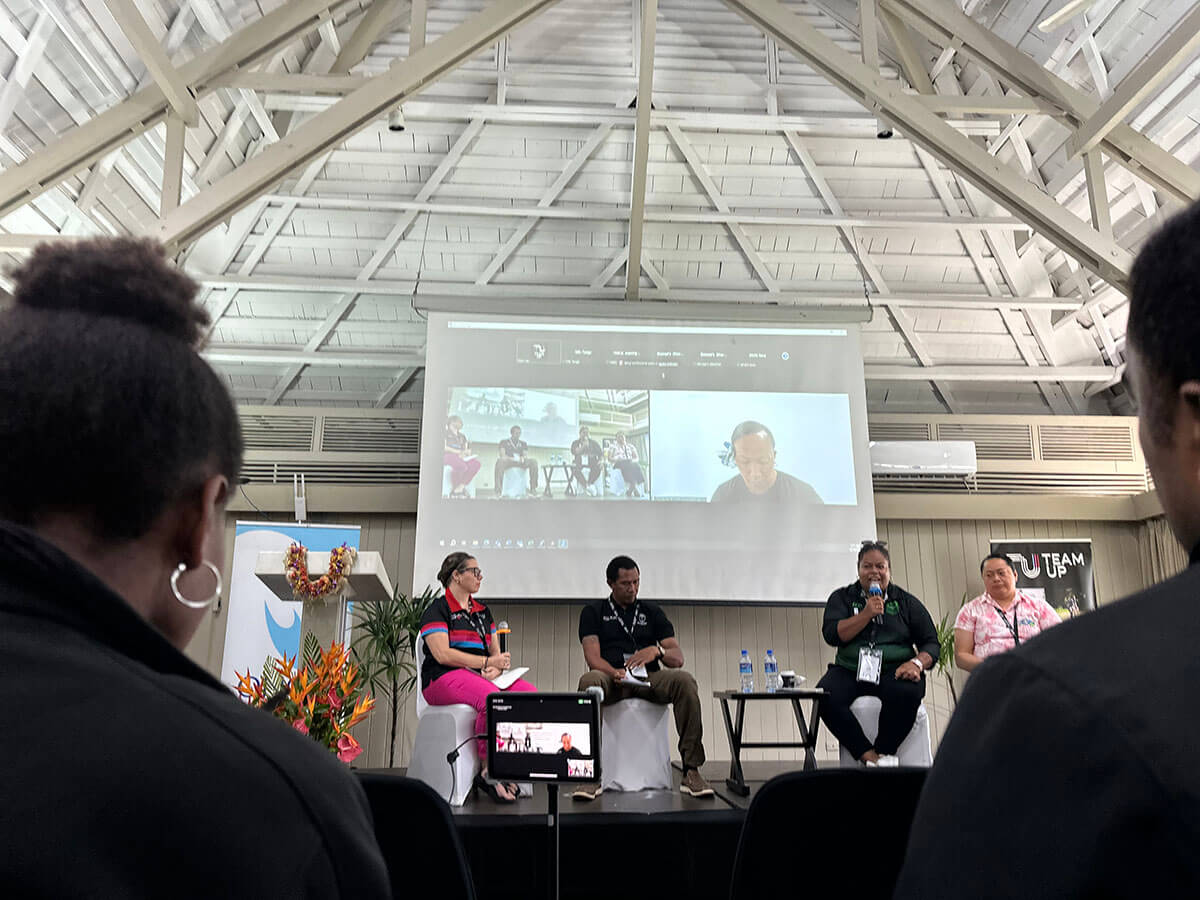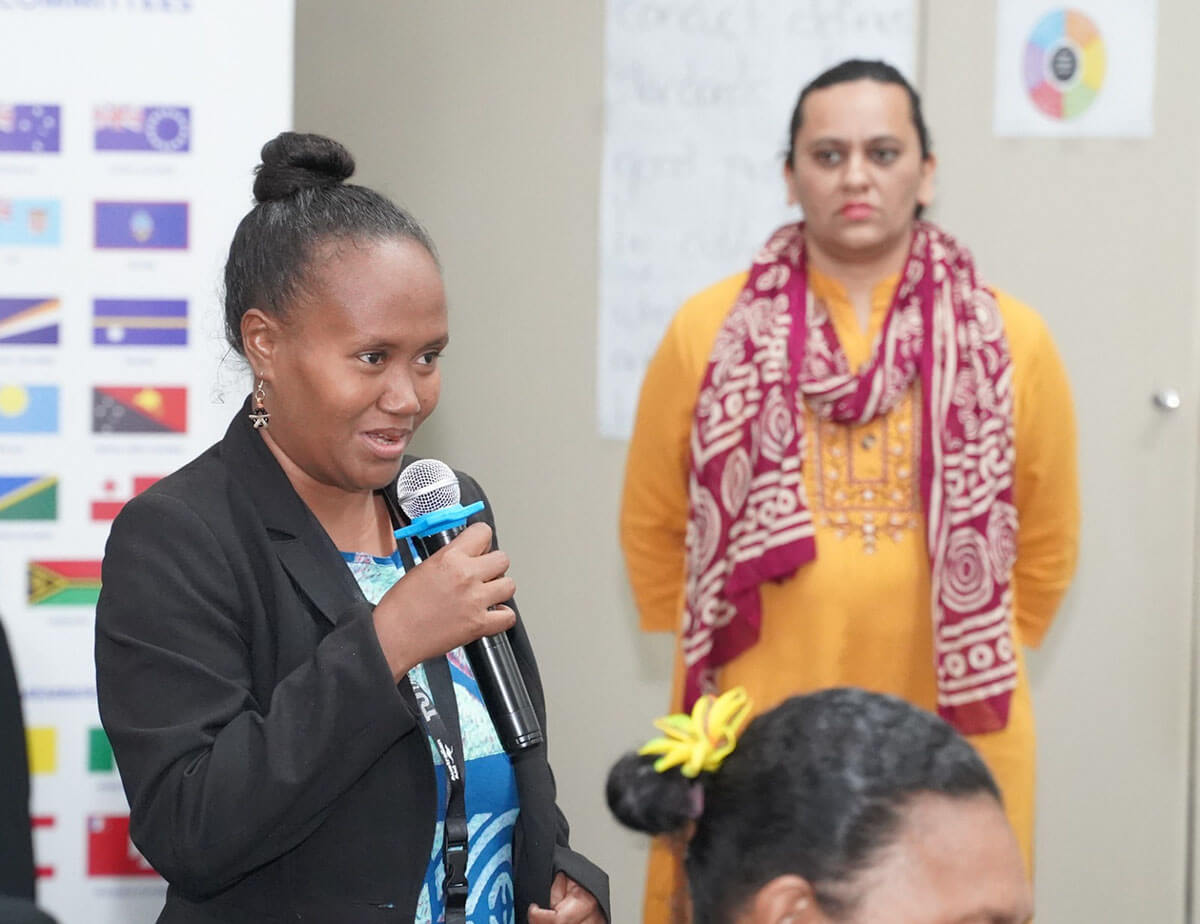The recently concluded Regional Safeguarding Skills Building Workshop, which was hosted by the Oceania Sport, Equality and Inclusive Communities Impact Network, has proven to be more than just a workshop; it’s a powerful blueprint for creating a safer, more inclusive sporting environment.

The Regional Workshop is hosted by the Oceania Sport, Equality and Inclusive Communities Impact Network – a collective of committed stakeholders who share a common vision of promoting gender equality, inclusion, and safety in and through sports in the Pacific region, and is initiated by the Oceania National Olympic Committees (ONOC), through its Equity Commission, the Australian Government’s sport for development program Team Up, the UN Women Fiji Multi-Country Office (MCO), and the International Olympic Committee (IOC) through Olympism365 and Olympic Solidarity.
With shared values and intersecting interests, these organisations are collaborating on initiatives, including the regional safeguarding workshop, with the aim of ensuring more women, girls and communities can access the benefits of sport, that more sport organisations are safe and inclusive, and that policies, institutions and networks in the region support and celebrate gender equal, inclusive, and safe sport for all participants.
UN Women Fiji MCO’s support is through the Pacific Partnership to End Violence Against Women (Pacific Partnership), funded primarily by the European Union, and the Governments of Australia and New Zealand, and UN Women.

The three-day workshop, held from 11-13 October, brought together participants from across the Pacific region who engaged in discussions, practical training sessions, and the sharing of best practices to create a safeguarding culture within sports organisations.
While the workshop itself was immensely valuable, the commitment to action sets this initiative apart. Each National Olympic Committee (NOC) represented at the workshop will receive financial support to enhance safeguarding protocols within their respective organisations. This substantial funding, provided by the International Olympic Committee through Olympism365 and Olympic Solidarity, is more than a gesture; it’s a catalyst for immediate change.
Speaking on behalf of the IOC through Olympism365 and Olympic Solidarity and the National Olympic Committees of the 17 countries across Oceania, Co-Chair of the ONOC Equity Commission, Liz Dawson, thanked the Impact Network Partners, Team Up, UN Women and ONOC for facilitating and resourcing the regional safeguarding workshop.

Dawson added: “We know that when we leave here over the weekend and go back to our homes, our work and our communities, we must be the change makers and for our NOC leaders, we must take up the baton, as we are being asked to by athletes, by the IOC, and along with our member sports, we must be strong and constant, we must be brave and courageous, and we must stand up for what is right.”
The impact of this initiative goes beyond the workshop itself. It represents a call to action and a commitment to translate the discussions and knowledge gained into real-world change. By providing financial support directly to NOCs, the Impact Network and its partners are ensuring that the conversation on safeguarding is transformed into tangible actions, making sports safer and more accessible for everyone across the Pacific region, including women and girls.
Faye-Zina Lalo from the PNG Olympic Committee, who also took part in the workshop, remarked that: “Participating in the three-day regional safeguarding workshop was an enriching experience, where I had the privilege to connect with dedicated representatives from sports across the Pacific, as well as frontline service providers. We came together to learn, share, and grow in our commitment to safeguarding the integrity of sports in our region.
In addition, Faye highlighted that: “The PNG Olympic Committee is excited to apply the knowledge gained from the Safeguarding Workshop, coupled with the generous financial support, to strengthen our safeguarding measures. This support reflects a commitment to positive change and the power of collaboration. We are ready to fortify our safeguarding protocols, creating a safer and more inclusive sporting environment. Armed with knowledge and resources, we aim to build a legacy of trust, respect, and integrity in sports.”

According to Beauty Brightlyn, one of the participants and a dedicated frontline service provider with Seif Ples, an agency administered by the Ministry of Police and National Security and Corrections Services in the Solomons, the workshop offered a unique opportunity to delve into the distinct approaches adopted by front-line services combatting gender-based violence across the Pacific.
Beauty explained: “It provided an invaluable platform for us to gain insights into how different front-line services are tackling the complex issue of gender-based violence in diverse Pacific settings. The Pacific region is characterised by its rich cultural diversity, and this workshop shed light on how these varied backgrounds influence strategies to address gender-based violence. The workshop participants recognised that a one-size-fits-all approach is not effective; instead, tailoring efforts to suit the unique needs of each Pacific nation is essential.
Moreover, she passionately emphasised the potential of sports as a catalyst for change.
“Sports have the power to reach a broad audience and impact social norms positively. We discussed ways to collaborate more with sports organisations in the Solomon Islands to make them more inclusive and safer for all.”
Summarising the three days of content, lead workshop facilitator and Team Up SocialInclusion Specialist Roshika Deo commented, “During the workshop, we explored safeguarding dynamics, including disability inclusion, gender-based violence, child abuse, and power imbalances. There was immense value in having the diverse views and experiences of participants, including people with disabilities, LGBT+ individuals, and youths, who identified responses to safeguarding issues in their settings with support from local service providers. The participants’ enthusiasm and commitment demonstrate how knowledge and resources empower sports organisations to ensure safety and accessibility for all. This also enables addressing development issues like gender-based violence and disability rights through sports. We remain committed to supporting sports organisations with technical assistance and look forward to seeing the commitments from the workshop materialise”.
The Regional Safeguarding Skills Building Workshop has marked a transformative moment in the Pacific region’s sports landscape. It is a testament to the commitment of all stakeholders involved to go beyond talk and actively work towards a safer, more inclusive sporting environment.
###
About The Oceania Sport, Equality and Inclusive Communities Impact Network: The Oceania Sport, Equality and Inclusive Communities Impact Network is a group of organisations which share a commitment to promoting equality and inclusion in, and through sport, and ending violence against women and girls in the Pacific and is initiated by the Oceania National Olympic Committees through its Equity Commission, the Australian Government’s sport for development program Team Up, the UN Women Fiji Multi-Country Office and the International Olympic Committee through Olympism365 and Olympic Solidarity. The Impact Network is collaborating with the aim of ensuring more women, girls and communities can access the benefits of sport, that more sport organisations are safe and inclusive, and that policies, institutions and networks in the region support and celebrate gender equal, inclusive and safe sport.
About Oceania National Olympic Committees (ONOC) and the ONOC Equity Commission: Established in 1981, the Oceania National Olympic Committees (ONOC) is one of five Continental Associations within the Olympic Movement. It looks after the interests of 17 member nations in the Oceania Region, including Australia and New Zealand as well as seven associate members.
The Equity Commission Oceania (ECO), formerly the Women and Sport Commission (WASO), was established in April 2004 to promote and coordinate the involvement of women in sport across the Oceania region. The Commission works with the vision to see ‘women and girls empowered through sport’.
About Team Up: Team Up is the Australian Government’s sport for development program in the Asia-Pacific. With more than 60 partners across seven Pacific Island countries, our programs are specifically designed to provide all people, regardless of gender or ability, the opportunity to realise their full potential through sport.
About UN Women Fiji Multi-Country Office (MCO) and the Pacific Partnership to End Violence Against Women and Girls (Pacific Partnership): The Pacific Partnership to End Violence Against Women and Girls (Pacific Partnership) brings together governments, civil society organisations, communities and other partners to promote gender equality, prevent violence against women and girls (VAWG), and increase access to quality response services for survivors.
About the International Olympic Committee (IOC): The International Olympic Committee is a not-for-profit, civil, non-governmental, international organisation made up of volunteers which is committed to building a better world through sport. It redistributes more than 90 per cent of its income to the wider sporting movement, which means that every day the equivalent of USD 4.2 million goes to help athletes and sports organisations at all levels around the world.
About Olympism365: Olympism365 is the IOC’s strategy aimed at strengthening the role of sport as an important enabler for the UN’s SDGs, which it achieves by collaborating with a range of partners inside and outside the Olympic Movement. The themes and priority areas for Olympism365 reflect the role that sport and Olympism in society can play for the SDGs by contributing to creating healthier and more active communities, more equitable, safer and inclusive communities, peacebuilding and education and livelihoods.
###
About ONOC
Established in 1981, the Oceania National Olympic Committees (ONOC) is one of five Continental Associations. It looks after the interests of 17 member nations in the Oceania Region, including Australia and New Zealand as well as seven associate members.
ONOC has an office in Guam where Secretary General Mr. Ricardo Blas is based and the Secretariat in Suva, Fiji, where the Office of the President Dr Robin Mitchell is located.
All services and-programmes are based on the ONOC Strategic Plan for 2018-2021, and its 4 Core Functions of (1) Building and Strengthening NOCs Capacity (2) Cultivating Strategic Partnerships (3) Contributing towards Sporting Excellence and (4) Leading by Example.
###
For more information, please contact;
Shivneel Narayan
Chief Communications Officer (Acting)
shivneel@oceanianoc.org
###
Digital Channels
For up-to-the-minute information on ONOC and regular updates, follow on Facebook, Twitter, Instagram, LinkedIn and YouTube.
